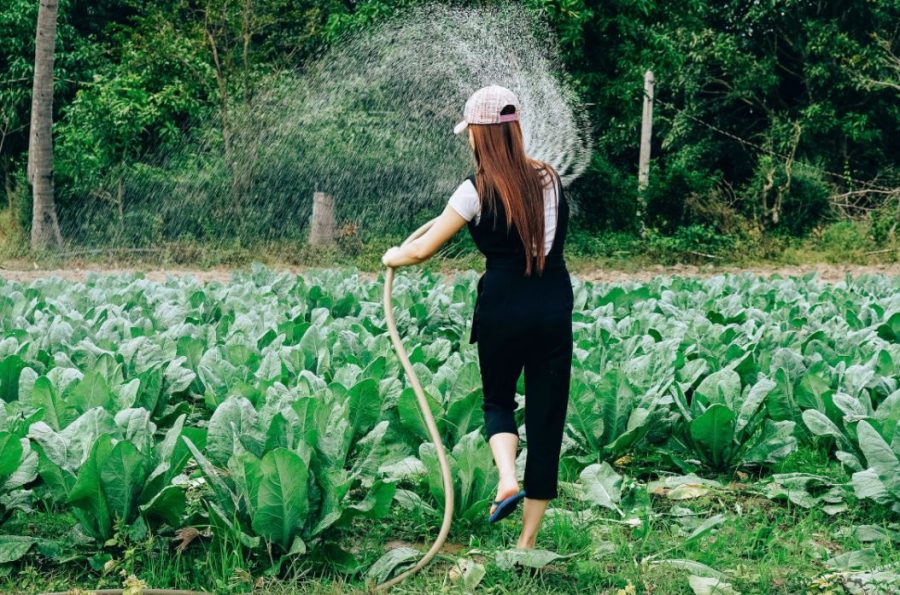Your homestead might have started as a small garden, as you gain experience, it will likely outgrow its original plot. Growing your food is cheaper and healthier and not as difficult as you might think. Here are some tips when your garden grows beyond just garden beds.
If you have given up the busy city life for the slower life of a country homestead, then there are many things you need to purchase for all of the new farming tasks you will be performing. Since you probably aren’t independently wealthy, there are things you can do to help contain the costs expanding your gardens to produce yielding farmland.
Planning the Garden
Once you’ve decided to expand your garden beyond the garden beds, it takes more planning. This is especially true if you are new to gardening. To have a bountiful harvest, you need water, nutrients in the soil, and plenty of sunshine.
If there are trees that cast shade on the area you want to develop for planting, you can consider removing them. Or you might plant vegetables that do well in partial sunshine near the trees. Irrigation is another consideration. You can install an irrigation system or drip irrigation tubing that will cover the entire garden.
Set Yearly and Long-Term Budget for Farm Equipment
While you may be tempted to hit the farm supply stores and buy everything you think you might need for your first year on the farm, this really isn’t advisable and is actually a good way to spend a lot of money on things you may discover you never use. Instead, sit down before you move and make both a short-term and long-term budget for supplies and equipment and then stick to those budgets when you start shopping.
Consider Renting Farm Equipment to Test Before Committing to Purchase
Unless you have a lot of previous farming or ranching experience, it is advisable you rent your larger pieces of equipment for the first time or two you need to use them. By renting different tractors or other specialty equipment, you will get a feel for the things you like and don’t like before making a commitment to purchase something and use it for many years into the future.
Buying a Garden Tractor
A large garden takes more equipment, and you should consider buying a garden tractor. Not only will you have to prepare the soil during the spring, but again in the fall. And doing this by hand is probably out of the question depending on the size of your homestead.
You can get various attachments with a garden tractor like a tiller, plow, bedder, and cultivator. These attachments will make working in your large garden much easier and improve the yield of your garden. The garden tractor attachments will help break up large dirt clods, create rows for planting, adding nutrients to the soil, and help with weeding.
Remember that you’ll need to get tractor services occasionally to keep your tractor in good repair. It’s good to do this at least annually so that you can catch any minor issues before they cause your tractor to break down. Unexpectedly losing your tractor because of poor maintenance can make your gardening work much more difficult. If it does break down unexpectedly, get it checked out as soon as possible.
Buy the Best Quality Farm Equipment You Can Afford
While you may dream of a brand new, green and yellow painted John Deere tractor or utility vehicle for your new small farm, first, make sure one fits into your budget. If so, then purchase the model with the necessary functions you need but not a lot of extras you don’t. Don’t choose a tractor just for the name or the bells and whistles. Choose the right tractor for your needs.
Everything from the hoe you use to plant your personal garden to the tractor you use to plow the fields, you should always purchase the best quality equipment you can afford. In the case of smaller tools and farm implements, cheap options will frustrate you every single time you use them and their lifespan will be shorter than quality items. When it comes to larger vehicles and farm equipment, if you can’t afford new then purchase a gently used option. A used Kubota or John Deere tractor is nearly always a better option than buying a new one made by an unknown manufacturer with lower quality standards.
Choosing the Right Vegetables
Before you start planting, you need to choose the vegetables that will grow the best in your region. You can look at a USDA Plant Hardiness Zone Map that will show which crops grow best in each growing zone of the country.
Secondly, you want to grow the vegetables that you and your family enjoy the most. There’s no point in growing fruits or vegetables that no one in your family will eat. You also want to choose vegetables that can be easily stored, canned, and frozen for use throughout the year until the next growing season.
The Best Growing Conditions
One way to have healthy soil each season is to rotate crops. You don’t want to plant certain vegetables in the same spot as you did the previous year. Good soil needs nitrogen, phosphorus, and potassium, and some plants can deplete the soil more than other plants.
You can decide if you want an organic garden or not. Fertilizers like bone meal are good, but if you don’t want to use fertilizer from animals, you can use seaweed meal. Making your own compost will also provide your garden soil with excellent nutrients each year.
Planning your garden on paper or the computer will give you an idea of what plants you want and where to plant them in a large garden. Once you have the design, using the above tips will ensure a plentiful garden each year.

